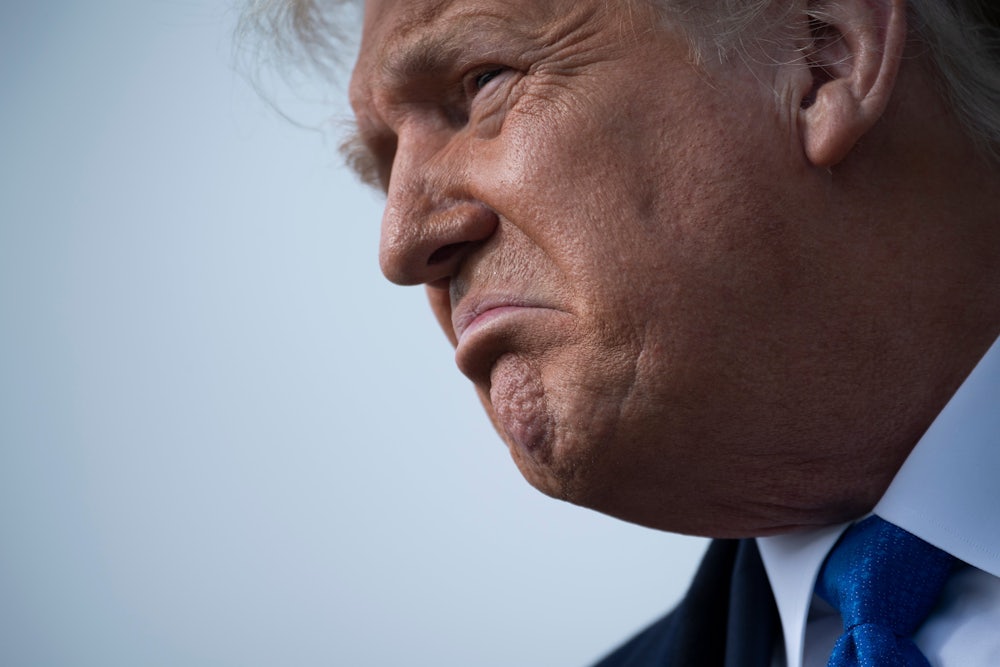There’s gratitude for you. You halve corporate taxes and slash regulations indiscriminately, and Wall Street thanks you by going haywire less than a week before you’re up for reelection.
“Stock market drop a blow to Trump’s election messaging” blares today’s lead story, by Jeff Stein, in The Washington Post. “The Stock Market Is on the Edge of a Historic Crash,” Dan Runkevicius wrote this morning in Forbes. What the hell? At 8:30 a.m., the Commerce Department reported third-quarter gross domestic product was up 33.1 percent on an annualized basis, the biggest gain in history. In response, the Dow dropped 200 points. It rebounded later, but The Wall Street Journal suggested that uptick probably had more to do with anticipated strong earnings set to be announced later today by Apple, Alphabet (Google), Facebook, Amazon, and Twitter.
What exquisite torture for Donald Trump. He could blame stock market volatility on Wall Street’s growing conviction that Joe Biden will be elected president on Tuesday, but given Trump’s oft-stated belief that stock performance is the single infallible metric of his presidency, that would concede Biden really will be elected president on Tuesday. (For what it’s worth, USA Today says Wall Street is more worried that Democrats will win the Senate; having written Trump off already, it now frets that divided government won’t be available to keep current tax rates in place.)
In Stein’s Post story, Stephen Moore, the Trump economic adviser without portfolio or doctorate, says, “Trump has to keep saying, ‘Pelosi blocked the [Covid stimulus] plan because she wanted the blue state bailout.’” But as Stein points out, the president (perhaps not coincidentally pumped up on steroids) “kept trying to cancel and then un-cancel the negotiations, sometimes multiple times in a week.” Moreover, that analysis is hard to square with Moore’s own argument yesterday (in an op-ed he probably filed some days before) that the market’s rise constituted “a bet that President Donald Trump will defy the odds and win.”
Trump leaned hard into the GDP number on Twitter this morning, bellowing that “Next year will be FANTASTIC!” But by then, every financial journalist in America had already pointed out at least a dozen reasons not to take the expected rise very seriously. Even Fox News discounted it, noting in the very same sentence in which it reported the 33.1 percent growth figure that “the nation remains in a deep hole from the COVID-induced recession.” Et tu, Rupert?
It could be that, for investors, a coronavirus reckoning is finally at hand. Covid-19 cases are at an all-time high, and all the president does in response is tell a rally full of maskless followers, “With the fake news, everything is Covid, Covid, Covid, Covid.” If Trump had a literary bent, one might suspect him of echoing deliberately Lear’s despairing cry of “Never, never, never, never, never,” in Act V’s “My poor fool is hanged” speech, the dead daughter in his arms not beloved Cordelia but Trump’s own moribund reelection prospects. (Even knowing that this is not the case, I can’t help reading the V in “Act V” as a Halloween rictus mocking the V-shaped recovery that Trump can’t seem to will into existence.)
But we were talking about Wall Street. I hesitate to conclude the stock market is responding to Covid news for the simple reason that, except at the beginning, investors never particularly cared about Covid-19. As for GDP, if Wall Street didn’t care after learning it fell 31 percent in June, why should it care now, after learning it rose 33.1 percent in September?
The brutal truth is that financial markets heed secret harmonies that convey, imperfectly and solipsistically, only whether the financial markets themselves will rise or fall. All else is sentimentality and vanity. Experts (including, now, the chief economist at the White House National Economic Council) admonish us not to mistake the stock market for the economy. More cynically, I have considered (here and here) whether, to the contrary, the stock market is the only economy we’ve got left.
But whatever the financial markets are, rest assured that they don’t give a damn about Donald Trump, and never did. Why should they? As a developer, he borrowed heavily against the future and then stiffed his creditors. As president, he’s done much the same with the federal budget and carbon emissions. The banks were onto this guy long before the rest of us, and they’ll weep no tears for him on November 3.
